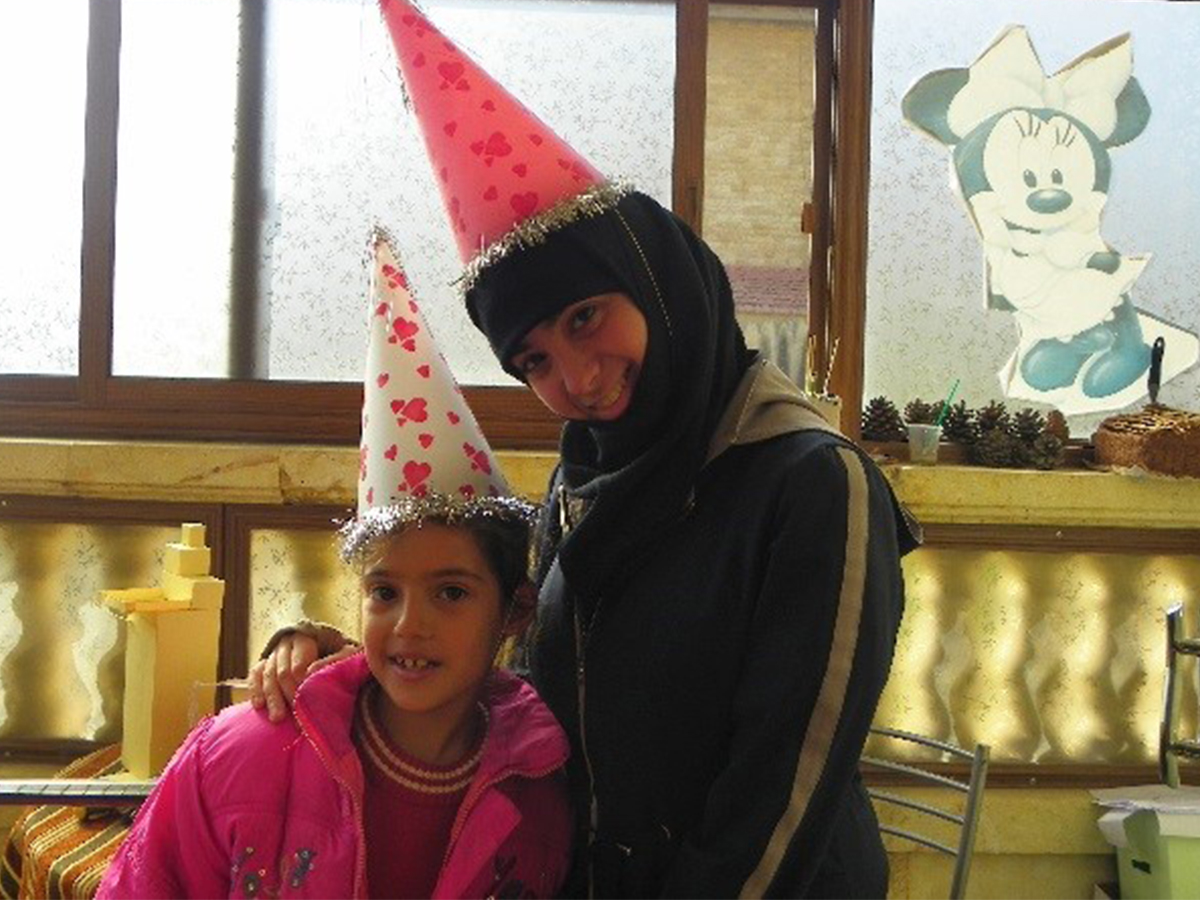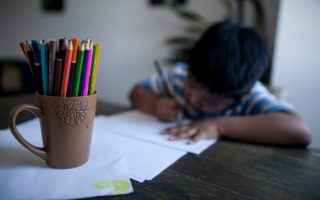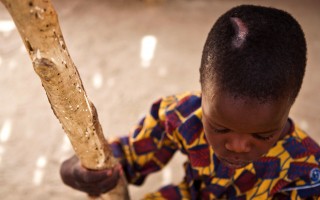
Abrar Mechmechia smiles with a young girl whom she worked with at the SOS Children’s Villages in Syria. © Abrar Mechmechia
By Hannah Scott
In her five years as a volunteer, clinician and child psychologist in conflict zones, Abrar Mechmechia has heard more stories and witnessed more trauma than some may ever know of in their entire lifetimes.
In 2015, Abrar entered a youth centre where she worked in Aleppo, Syria, to find that the children were terrified. She soon learned why: a bomb had dropped in the street behind the facility where the children were out playing. Devastation was left in its wake — one child was killed. Two were injured.
Even though she was shocked and horrified, Abrar knew the importance of directing her energies towards providing psychological support to the children.
“Living and working in inhumane circumstances filled with fear during the war in Syria without a doubt shaped the way I practise psychology today,” Abrar says.
Born in Hamilton, Ont., Abrar moved back to Syria with her family at the age of six. She grew up in Aleppo, where she enjoyed a childhood of peaceful moments until the conflict began.
“It is still a difficult time to remember. What began as a peaceful revolution suddenly turned into war, ranking my city one of the most dangerous in the world.”
As the war started in 2011 just as she was finishing high school, Abrar felt a strong need to get involved in the community and provide people with the right support in a crisis. She chose to major in psychology. As a fourth-year student, she was hired as a psychotherapist by SOS Children’s Villages for youth, children and their mothers. While there, she discovered the unique approach and camaraderie she has with children, and the beauty of working with them as they are “full of peace, life and energy.”
War and conflict can have a large impact on mental health, especially for children, she notes.
“War is living a daily non-normal. It is an unsteady and unending situation filled with fear. There are no answers to the endless questions,” Abrar says. “War is consistent daily trauma which is incomprehensible, especially to children.”
Abrar notes that war and conflict situations cause mental health disorders for both children and adults. Some common disorders include anxiety, depression and developmental problems.
Post-traumatic stress disorder and depression were common during Abrar’s work with children in Syria. She noticed many children had nightmares and sleeping problems. Some children also struggled with self-esteem problems, aggression and extreme violence.
“Conflict situations also cause physical damage and disabilities which contribute immensely to trauma for children,” Abrar adds.
She remembers one of her hardest cases.
“A 10-year-old boy was injured and burned his chest. As a result, he had to go through many surgeries. After the incident he no longer wanted to go to school or even come to the centre to play,” Abrar says. “He was seriously traumatized with symptoms of depression that lasted for several months. After working with him for almost a full year he was able to get back to his normal life.”
When working with children, Abrar says she builds a trustworthy relationship with them – she’s not just a counsellor, but a friend. One method Abrar uses often with the children is art therapy and artistic expression. She was a project manager and creator for an art psychotherapy centre in Syria.
“The idea started when I felt the need to work on a long-term treatment for trauma other than focusing on first aid support,” Abrar says. “It was going to be the first centre in Syria focused on treatment by combining art with psychotherapy methods.”

Drawings and art created by Syrian children who completed art therapy with Abrar. © Abrar Mechmechia
Unfortunately because of administrative obstacles, the centre never came to fruition – but Abrar knows the importance of art therapy.
Abrar says that the creative outlet art provides is a liberating expression when words fail. It helps process the traumatic events in a new way, examine complicated feelings and facilitate discussion.
“I had a seven-year-old client who had witnessed the death of his brother in front of his eyes, so he lost words and became speechless after the incident for a month,” Abrar says. “All we did was communicate with him using drawings, paintings, or colouring until he was ready to talk again after a month.”
In 2017, Abrar began to offer front-line support in Aleppo and was shocked by the level of destruction that had ravaged her hometown.
“It was terrifying to see people’s homes turned to rubble. It was there that I realized our huge loss, how deeply my city was damaged, and the suffering and sorrow of my people. It was a painful feeling.”
It was this experience that made Abrar decide to return to Canada. Abrar believed that one day, she would come back to Syria and bring change with her.
Now back in Hamilton, Abrar is a clinical consultant on the OASIS program at Thrive: Child and Youth Trauma Services.
Abrar says it is everyone’s duty to raise awareness for people who are living in crisis situations.
“We need to make everyone aware that these areas are in dire need of more mental health support as people suffer from trauma on a daily basis in inhumane conditions.”
Learn more about how UNHCR provides mental health and psychosocial support on our website.





